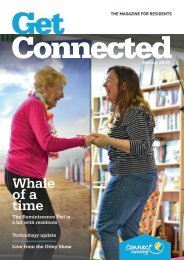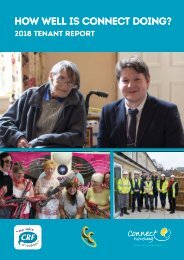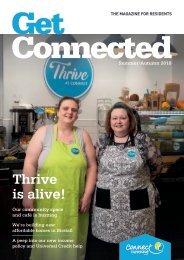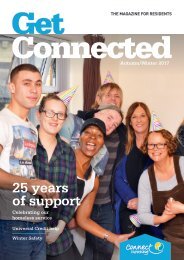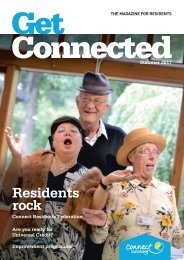Get Connected Summer 2016
Get Connected is Connect housing's tenant magazine that is sent our quarterly with news and exciting happenings reported on.
Get Connected is Connect housing's tenant magazine that is sent our quarterly with news and exciting happenings reported on.
You also want an ePaper? Increase the reach of your titles
YUMPU automatically turns print PDFs into web optimized ePapers that Google loves.
SAFETY<br />
Be gas safe<br />
Poorly maintained gas appliances are<br />
a serious safety threat in the home, and<br />
carbon monoxide poisoning, although<br />
relatively rare, can be fatal.<br />
YOUR GAS SERVICE<br />
APPOINTMENT<br />
By law we must carry out a gas safety<br />
inspection each year to ensure your home<br />
is safe. Our gas contractor Sure will write<br />
to you to tell you when your annual service<br />
is due. It’s important you give access,<br />
so we can check your home is gas safe.<br />
Don’t forget this is a free service.<br />
CARBON<br />
MONOXIDE<br />
You can’t see, smell or taste carbon monoxide<br />
and it can kill without warning in a matter of<br />
hours. Symptoms can often be mistaken for<br />
flu, and other signs that there may be a carbon<br />
monoxide leak in the home are brown staining<br />
around gas appliances and yellow-tinged pilot<br />
lights that frequently go out. This is why it is<br />
important for us to gain access and inspect all<br />
gas appliances. If you have a gas fire in your<br />
home, we will fit a carbon monoxide alarm which<br />
we will test every year, however please ensure<br />
you test it regularly too.<br />
IF YOU<br />
SMELL GAS<br />
If you can smell gas please leave the property<br />
as soon as possible and call the National Grid<br />
emergency line on 0800 111 999.<br />
Be water safe<br />
Legionnaires’ disease is an illness<br />
caused by breathing in small droplets<br />
of water contaminated by bacteria.<br />
It can affect anybody and is potentially<br />
fatal, but it’s very rare in the UK.<br />
Hot and cold water systems in homes are<br />
a potential source for bacteria growth. Bacteria<br />
can survive low temperatures, thrives at<br />
temperatures between 20–45°C, but is killed<br />
in high temperatures of 60°C and above.<br />
There are some simple things you can do<br />
to make sure the water in your home is safe.<br />
Set hot water cylinders at 60°C or<br />
above (take care not to burn yourself).<br />
Clean limescale from taps and<br />
shower heads every three months.<br />
Don’t leave your shower head<br />
sitting in water.<br />
If you’ve been away for over a week,<br />
run all your taps (and shower) for a<br />
few minutes before using the water.<br />
Have you experienced<br />
or seen a hate crime?<br />
Stop Hate UK is working to challenge all<br />
forms of hate crime and discrimination.<br />
They provide confidential reporting and<br />
support for victims and witnesses.<br />
You can call their free 24 hour helpline<br />
on 0800 138 1625 or visit their website<br />
www.stophateuk.org. You can also visit<br />
Connect’s Leeds office which is an official<br />
Hate Incident Reporting Centre.<br />
A hate crime is an incident committed<br />
against someone because of their disability,<br />
gender-identity, race, religion or belief, or<br />
sexual orientation and should be reported.<br />
12




